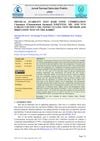22 citations,
March 2021 in “Materials Today Bio” Scaffold-based strategies show promise for regenerating hair follicles and teeth but need more research for clinical use.
 January 2002 in “Dermatologic Surgery”
January 2002 in “Dermatologic Surgery” Minoxidil is effective in preventing hair loss after facelift surgery.
 1 citations,
January 2024 in “International Journal of Advanced Research in Science, Communication and Technology”
1 citations,
January 2024 in “International Journal of Advanced Research in Science, Communication and Technology” Herbal hair scrubs can effectively prevent and treat hair problems, boosting self-confidence.
January 2021 in “Journal of cosmetology & trichology” PRP therapy can be effective for early-stage common hair loss, with most patients seeing improvement, but there are inconsistencies in treatment methods.
 April 2024 in “Current research in nutrition and food science”
April 2024 in “Current research in nutrition and food science” Taking an amino acid supplement improved skin, hair, and nail health in women.
December 2023 in “Plants” Fissistigma oldhamii has compounds that help with pain, inflammation, and other health issues.
 10 citations,
April 2019 in “Journal of Analytical Science and Technology”
10 citations,
April 2019 in “Journal of Analytical Science and Technology” Lactobacillus plantarum hydrolysates may help increase hair growth by boosting VEGF production.
 8 citations,
September 2019 in “Eating and Weight Disorders - Studies on Anorexia, Bulimia and Obesity”
8 citations,
September 2019 in “Eating and Weight Disorders - Studies on Anorexia, Bulimia and Obesity” A woman with anorexia nervosa improved after treatment for pellagra, reminding doctors to check for this deficiency in patients with eating disorders.
 March 2017 in “InTech eBooks”
March 2017 in “InTech eBooks” Acne vulgaris is a common skin condition that can cause low self-esteem and depression, and early treatment is important to prevent scarring.
7 citations,
October 2018 in “South African journal of botany” Clausena anisata may be effective in treating acne due to its ability to fight bacteria, reduce inflammation, and possibly lower sebum production.
 May 2023 in “Jurnal farmasi sains dan praktis”
May 2023 in “Jurnal farmasi sains dan praktis” The hair tonic with cinnamon oil and coconut oil was stable and caused very mild irritation.
 9 citations,
April 2021 in “Frontiers in Immunology”
9 citations,
April 2021 in “Frontiers in Immunology” Unconventional lymphocytes are important for quick immune responses and healing of skin and mucosal barriers.
 5 citations,
February 2022 in “International Journal of Molecular Sciences”
5 citations,
February 2022 in “International Journal of Molecular Sciences” Different immune cells like platelets, mast cells, neutrophils, macrophages, T cells, B cells, and innate lymphoid cells all play roles in skin wound healing, but more research is needed due to inconsistent results and the complex nature of the immune response.
 August 2022 in “International journal of research in pharmacy and chemistry”
August 2022 in “International journal of research in pharmacy and chemistry” Teak is a durable, termite-resistant wood with medicinal benefits.
 2 citations,
September 2022 in “Frontiers in Immunology”
2 citations,
September 2022 in “Frontiers in Immunology” T-regulatory cells are important for skin health and can affect hair growth and reduce skin inflammation.
 August 2014 in “Springer eBooks”
August 2014 in “Springer eBooks” Certain gene mutations can weaken the skin barrier and, when combined with environmental factors, lead to eczema and severe itching.
 August 2023 in “International Medical Case Reports Journal”
August 2023 in “International Medical Case Reports Journal” Acne necrotica can be effectively treated with topical cream and antibiotics.
 November 2023 in “Deleted Journal”
November 2023 in “Deleted Journal” Cedrus libani has potential medicinal uses but needs more safety studies.
 21 citations,
April 2019 in “Clinical, cosmetic and investigational dermatology”
21 citations,
April 2019 in “Clinical, cosmetic and investigational dermatology” The document concludes that stopping shaving or removing affected hair can alleviate Pseudofolliculitis barbae (PFB).
 1 citations,
January 2008 in “Elsevier eBooks”
1 citations,
January 2008 in “Elsevier eBooks” The document concludes that various disorders can cause hair loss in dogs, each requiring different treatments, and some may heal on their own.
4 citations,
March 2022 in “BioEssays” Hydra can help understand human hair follicle microbiomes and develop new skin disease therapies.
 7 citations,
February 2021 in “Dermatologic Therapy”
7 citations,
February 2021 in “Dermatologic Therapy” Sebaceous glands are involved in various skin disorders, some treatable with medications like finasteride and minoxidil.
15 citations,
January 2022 in “Immune Network/Immune network” New targeted immunotherapies are improving treatment for inflammatory skin diseases.
 21 citations,
July 2017 in “Journal of Cosmetic and Laser Therapy”
21 citations,
July 2017 in “Journal of Cosmetic and Laser Therapy” Vesicular carriers like liposomes may improve cosmetic skin treatment delivery and effectiveness but need more human research.
 111 citations,
March 2012 in “Expert Opinion on Drug Delivery”
111 citations,
March 2012 in “Expert Opinion on Drug Delivery” Liposomes could improve how skin care products work but are costly and not very stable.
 21 citations,
November 2021 in “Biomolecules”
21 citations,
November 2021 in “Biomolecules” Eclipta prostrata is a medicinal plant that helps treat diseases, protects the liver and nerves, and promotes hair growth.
29 citations,
June 2020 in “International Journal of Molecular Sciences” Notch signaling disruptions can cause various skin diseases.
 13 citations,
January 2018 in “BioMed Research International”
13 citations,
January 2018 in “BioMed Research International” Scalp involvement is common in pemphigus and can lead to hair loss, with the severity of scalp lesions linked to overall disease severity.
4 citations,
May 2018 in “Türk pediatri arşivi : İstanbul çocuk kliniği dergisi” Oral retinoic acid effectively treated collodion baby, with hair loss as the main side effect.
 23 citations,
November 2011 in “Journal of the European Academy of Dermatology and Venereology”
23 citations,
November 2011 in “Journal of the European Academy of Dermatology and Venereology” Hair loss is a rare but recognized symptom of pemphigus vulgaris, with patients usually regrowing hair after treatment.





















